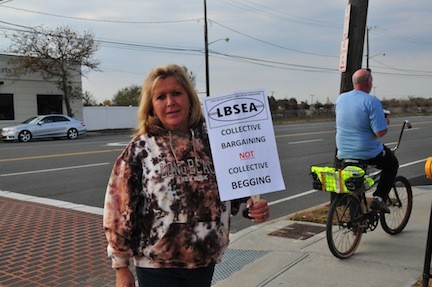School employees rally amid contract dispute
Union and district moving into new phase of negotiations
The Long Beach School Employees Association held “informational pickets” last week as a way to draw attention to its contractual dispute with the district.
The LBSEA represents the district’s non-instructional workers — bus drivers, custodial and maintenance workers and lunch aides — as well as teaching assistants. William Snow, its president, said that the group, which has around 450 members, is now in its fourth year without a contract and without pay raises. District officials said they also want to resolve the impasse, but they have financial restraints, like the state tax cap.
Snow said that the dispute originated in 2010, and that in the 2010-11 and 2011-12 school years, every other district union except the LBSEA received raises. Snow said that despite the fact that the union represents the district’s lowest-paid employees, the district constantly takes from it. Last year, when the district put together the current budget, Snow said, his group was hit the hardest: 80 to 90 percent of its members had their hours cut, and more than half now work too few hours to be eligible for benefits. The union feels overlooked and underappreciated, he said, and morale among the school’s workers is taking a hit.
“We are the day-to-day hands-on with the kids, from the minute they get on the buses to when they walk into the school,” LBSEA Vice President Joanne Rea said. “We’re not looking to get rich, we just want to be able to pay our bills like everyone else.”
Schools Superintendent David Weiss paints a different picture of the situation, saying that the district made a contract offer to the LBSEA in 2010, but the group declined it, and it was withdrawn. Now, Weiss said, there are new circumstances that affect the offers the district can make — the state tax cap and the still unfolding aftermath of Hurricane Sandy.
He said that the tax cap, which limits a school district’s property tax levy increase, constrain the district’s expenditures. “That change in circumstance becomes very important for the groups that we’re bargaining with to recognize and account for,” Weiss said. “Times change. The tax cap changes things from the first time we made an offer to this unit.”









